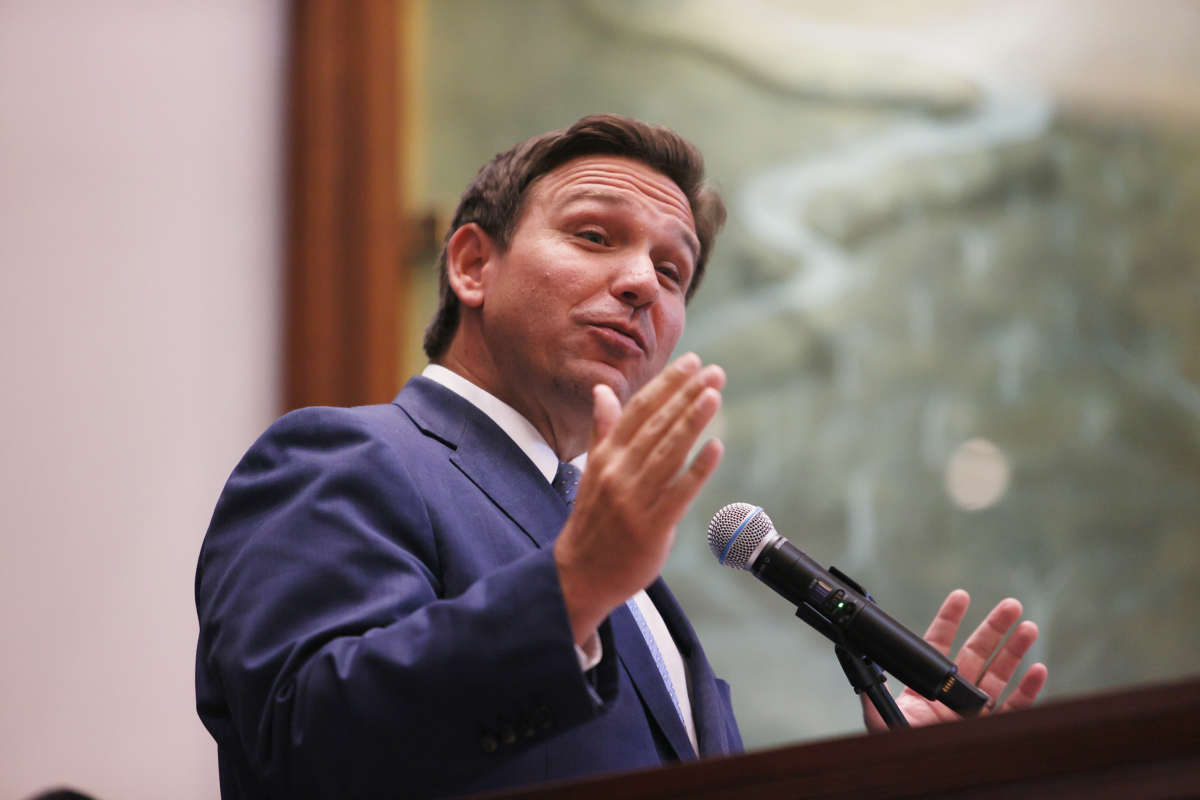Truthout is a vital news source and a living history of political struggle. If you think our work is valuable, support us with a donation of any size.
Donald Trump is in no danger of losing his core base of support within the Republican Party anytime soon. But a new survey suggests there may be someone else who is preferred by a larger proportion of GOP voters when it comes to who should be the party’s nominee for president in 2024.
A straw poll conducted at the Western Conservative Summit in Denver, Colorado, over the weekend asked participants, 371 of whom responded, to say if they approved or disapproved of a number of potential Republican candidates for president. Trump received the approval of more than 71 percent of the participants who took part. But Florida Gov. Ron DeSantis came in first place, with 74.12 percent saying they’d approve of his candidacy if he won the nomination.
Both men held wide margins over the other proposed names, with Sen. Ted Cruz of Texas a distant third with a 42.86 percent approval rating among poll participants.
The poll’s results do not necessarily mean that more Republican voters prefer DeSantis over Trump, just that more agree he’d be a better pick than the former president. It’s highly likely that if the two were in a primary against each other for the party’s nomination in 2024 Trump would win, according to other polling figures that have been published recently. Indeed, a Politico/Morning Consult survey conducted last month found that around half of GOP voters would choose Trump as their first pick for the nomination, with just 7 percent saying DeSantis was their top choice.
Still, the Western Conservative Summit poll indicates that Republicans are aligned on the type of candidate they would like to have run for president. And that type of candidate is decidedly Trumpian, no matter which of the top two choices voters end up picking.
Some have opined that DeSantis is very similar to Trump, and there are certainly signs that confirm such reasoning. The Florida governor has imposed decidedly Trumpian laws on voting, including signing a law that restricts mail-in voting and criminalizes the handing out of food and water to voters waiting in long lines on election day. DeSantis took a Trumpian approach to the pandemic, too, refusing to impose shutdowns and not enforcing the wearing of masks or social distancing protocols to stop the spread of the coronavirus. Indeed, DeSantis signed a law early in May that made it illegal for municipalities to have mask rules enforced within their own jurisdictions.
If he doesn’t run for president in 2024, DeSantis would likely be on Trump’s short-list of potential vice presidential candidates. Trump himself has said he’s considering DeSantis as a possible running mate, as he ponders his own run. But while DeSantis’s Trump-like actions make him a strong candidate in Republican circles, both he and Trump are likely to face serious difficulties in mounting a win nationally among all voters three years from now.
A Quinnipiac University poll published late last month asked respondents whether they’d want to support candidates who mostly agree with Trump or those who mostly disagree with him. Among Republicans, 85 percent said they wanted someone who mostly agreed with Trump. But when the question was asked of all voters, only 39 percent said they wanted someone aligned with Trump’s positions, with 53 percent saying they would prefer voting for someone who mostly disagrees with his views.
Within that same poll, only 30 percent of respondents said they wanted to see Trump run again in 2024. Two-thirds of voters (66 percent) said they hoped he wouldn’t run again.
A terrifying moment. We appeal for your support.
In the last weeks, we have witnessed an authoritarian assault on communities in Minnesota and across the nation.
The need for truthful, grassroots reporting is urgent at this cataclysmic historical moment. Yet, Trump-aligned billionaires and other allies have taken over many legacy media outlets — the culmination of a decades-long campaign to place control of the narrative into the hands of the political right.
We refuse to let Trump’s blatant propaganda machine go unchecked. Untethered to corporate ownership or advertisers, Truthout remains fearless in our reporting and our determination to use journalism as a tool for justice.
But we need your help just to fund our basic expenses. Over 80 percent of Truthout’s funding comes from small individual donations from our community of readers, and over a third of our total budget is supported by recurring monthly donors.
Truthout has launched a fundraiser, and we have a goal to add 231 new monthly donors in the next 48 hours. Whether you can make a small monthly donation or a larger one-time gift, Truthout only works with your support.
